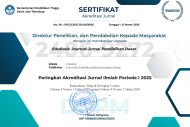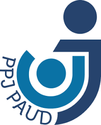Hubungan Pola Asuh Orang Tua Dengan Hasil Belajar Pkn Siswa SD Negeri 2 Caracas
Abstract
Keywords
Full Text:
PDFReferences
Anggraini, R. (2014). Hubungan pola asuh orang tua dengan motivasi belajar siswa. Jurnal Ilmiah Pendidikan Bimbingan dan Konseling, 2(1), 1-10. Diakses pada 6 Oktober 2016, dari http://e-journal.ikipveteran.ac.id.
Budang, P., Wedyawati. N., & Fransiska. (2017). Korelasi pola asuh orang tua dengan hasil belajar matematika pada siswa kelas IV SD Negeri Tengadak. Jurnal Pendidikan Dasar PerKhasa, 3 (2), 349-356.
Budiarnawan, K. A., Antari, N. N. M., & Rati, N. W. (2014) Hubungan antara konsep diri dan pola asuh orang tua terhadap hasil belajar IPA Siswa Kelas V SD di Desa Selat. Jurnal Mimbar PGSD Universitas Pendidikan Ganesha, 2(1), 1-10.doi:10.23887/jjpgsd.v2i1.2224
Casmini. (2007). Emotional Parenting. Dasar-dasar Pengasuhan Kecerdasan Emosi Anak. Yogyakarta: Pilar Media.
Chang, M., Park, B., & Kim, S. (2009). Parenting classes, parenting behavior, and child cognitive development in early head start: A longitudinal model. The School Community Journal, 19(1), 155-174. Diakses pada 1 Agustus 2020, dari http://files.eric.ed.gov/fulltext/EJ847434.pdf
Dasmo, Burhayati & Marhento, G. (2012). Pengaruh tingkat pendidikan dan pola asuh orang tua terhadap prestasi belajar IPA. Jurnal Formatif, 2(2), 132-139.
dx.doi.org/10.30998/formatif.v2i2.94
Hurlock, E. B. (2010). Psikologi Perkembangan Suatu Pendekatan Sepanjang Rentang Kehidupan (Alih Bahasa Istiwidayanti dkk. Edisi Kelima. Jakarta: Erlangga.
King, L. (2010). Psikologi Umum. Jakarta: Salemba Humanika.
Maghfuroh. (2014). Hubungan pola asuh orang tua dengan prestasi belajar anak SDN 1 Kabalan Kecamatan Kanor Kabupaten Bojonegoro. Jurnal Surya, 2(18), 59-68. Diakses pada 1 Agustus 2020, dari http://stikesmuhla.ac.id/wp-content/uploads/jurnalsurya/noXVIII/59-68- Jurnal-lilis.pdf
Nurmah. (2011). Hubungan pola asuh orang tua dengan prestasi belajar anak usia sekolah kelas 2 dan 3 di SDN Standar Nasional Kayu Putih 09 Pagi Jakarta Timur Tahun 2011. Jurnal STIK Medistra Indonesia, 1-9 Diakses pada 2 Agustus 2020, dari http://ayurvedamedistra.files.wordpress.com
Purwanto. (2013). Evaluasi Hasil Belajar.Yogyakarta: Pustaka Pelajar.
Rakhmad, J. (2005). Psikologi Komunikasi. Bandung: PT Remaja Rosdakarya.
Slameto. (2010). Belajar Dan Faktor-Faktor Yang Mempengaruhinya. Jakarta: PT. Rineka Cipta
Soraya, A. N. (2015). Pengaruh Kualitas Pola Asuh Orang Tua, Cara Belajar dan Peran Kelompok Teman Sebaya terhadap Prestasi Belajar Mata Pelajaran Ekonomi/Akutansi Kelas XI IPS di Madrasah Aliyah Yayasan Perguruan Islam Klambu Kec. Klambu Kab. Grobogan Tahun Pelajaran 2014/2015. Skripsi. Semarang: Universitas Negeri Semarang. Diakses pada 1 Agustus 2020, dari http://lib.unnes.ac.id/21139/1/7101411089-s.pdf
Sugiyono. (2014). Metode Penelitian Pendidikan Pendekatan Kuantitatif, Kualitatif, dan R&D. Bandung: Alfabeta.
Susanto, A. (2013). Teori Belajar dan Pembelajaran di Sekolah Dasar. Jakarta: Kencana Prenada Media Group.
Syah, M. (2010). Psikologi Pendidikan dengan Pendekatan Baru, Bandung: PT Remaja Rosdakarya.
Thoha, C. (1996). Kapita Selekta Pendidikan. Yogyakarta: Pustaka Belajar.
Tulus, T. (2004). Peran Disiplin pada Perilaku dan Prestasi Belajar. Jakarta: Grasindo.
Widhiasih, I., Sumilah, Abbas, N. (2017). Pengaruh Pola Asuh Orang Tua Terhadap Hasil Belajar IPS. Jurnal Kreatif: Jurnal Kependidikan Dasar, 7 (2), 189-199.
DOI: https://doi.org/10.17509/ebj.v2i1.26797
Refbacks
- There are currently no refbacks.
Copyright (c) 2020 Universitas Pendidikan Indonesia
This work is licensed under a Creative Commons Attribution 4.0 International License.
This journal is indexed by




.png)




.png)
1.png)


1.png)

.png)